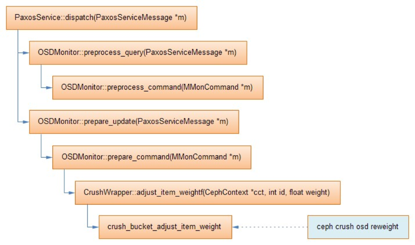这两者的区别实际上是osd weight和osd crush weight的区别:
# ceph osd tree
# id weight type name up/down reweight
-1 4.08 root default
-2 1.36 host osd-node1
0 1.36 osd.0 up 1
-3 1.36 host osd-node2
1 1.36 osd.1 up 1
-4 1.36 host mon
2 1.36 osd.2 up 1
其中,第二列对应osd crush weight,最后一列对应osd weight。
Crush weight实际上为bucket item weight,下面是关于bucket item weight的描述:
Weighting Bucket Items
Ceph expresses bucket weights as doubles, which allows for fine weighting. A weight is the relative difference between device capacities. We recommend using 1.00 as the relative weight for a 1TB storage device. In such a scenario, a weight of 0.5 would represent approximately 500GB, and a weight of 3.00 would represent approximately 3TB. Higher level buckets have a weight that is the sum total of the leaf items aggregated by the bucket.
A bucket item weight is one dimensional, but you may also calculate your item weights to reflect the performance of the storage drive. For example, if you have many 1TB drives where some have relatively low data transfer rate and the others have a relatively high data transfer rate, you may weight them differently, even though they have the same capacity (e.g., a weight of 0.80 for the first set of drives with lower total throughput, and 1.20 for the second set of drives with higher total throughput).
简单来说,bucket weight表示设备(device)的容量,1TB对应1.00。bucket weight是所有item weight之和,item weight的变化会影响bucket weight的变化,也就是osd.X会影响host。
如果通过ceph-deploy来部署osd,defaultweight的计算: 参考/etc/init.d/ceph
if [ "$type" = "osd" ]; then
get_conf update_crush "" "osd crush update on start"
if [ "${update_crush:-1}" = "1" -o "{$update_crush:-1}" = "true" ]; then
# update location in crush
get_conf osd_location_hook "$BINDIR/ceph-crush-location" "osd crush location hook"
osd_location=`$osd_location_hook --cluster ceph --id $id --type osd`
get_conf osd_weight "" "osd crush initial weight"
defaultweight="$(do_cmd "df $osd_data/. | tail -1 | awk '{ d= \$2/1073741824 ; r = sprintf(\"%.2f\", d); print r }'")"
get_conf osd_keyring "$osd_data/keyring" "keyring"
do_cmd "timeout 10 $BINDIR/ceph \
--name=osd.$id \
--keyring=$osd_keyring \
osd crush create-or-move \
-- \
$id \
${osd_weight:-${defaultweight:-1}} \
$osd_location"
fi
fi
注意
defaultweight="$(do_cmd "df $osd_data/. | tail -1 | awk '{ d= \$2/1073741824 ; r = sprintf(\"%.2f\", d); print r }'")"
osd weight的取值为0~1。osd reweight并不会影响host。当osd被踢出集群时,osd weight被设置0,加入集群时,设置为1。
Note that ‘ceph osd reweight’ is not a persistent setting. When an OSD gets marked out, the osd weight will be set to 0. When it gets marked in again, the weight will be changed to 1.
这篇文章做了详细介绍:
下面主要从代码的实现角度来看看两者的区别:
- (1)osd weight
对应OSDMap->osd_weight,它保存了所有OSD的weight:
unsigned get_weight(int o) const {
assert(o < max_osd);
return osd_weight[o];
}
float get_weightf(int o) const {
return (float)get_weight(o) / (float)CEPH_OSD_IN;
}
在pg->OSD的映射过程中,会将osd_weight数组传给CRUSH算法:
//pg --> osds[]
int OSDMap::_pg_to_osds(const pg_pool_t& pool, pg_t pg, vector<int>& osds) const
{
// map to osds[]
ps_t pps = pool.raw_pg_to_pps(pg); // placement ps
unsigned size = pool.get_size(); //pool size
// what crush rule?
int ruleno = crush->find_rule(pool.get_crush_ruleset(), pool.get_type(), size);
if (ruleno >= 0)
crush->do_rule(ruleno, pps, osds, size, osd_weight); ///CrushWrapper->do_rule
_remove_nonexistent_osds(osds);
return osds.size();
}
** osd weight对CRUSH算法的影响 **
CRUSH在选择OSD时,如果发现weight为0,就跳过该OSD。
/*
* true if device is marked "out" (failed, fully offloaded)
* of the cluster
*/
static int is_out(const struct crush_map *map,
const __u32 *weight, int weight_max,
int item, int x)
{
if (item >= weight_max) ///out
return 1;
if (weight[item] >= 0x10000) ///in
return 0;
if (weight[item] == 0) ///out
return 1;
if ((crush_hash32_2(CRUSH_HASH_RJENKINS1, x, item) & 0xffff)
< weight[item])
return 0;
return 1;
}
** osd reweight的实现 **
bool OSDMonitor::prepare_command(MMonCommand *m)
{
...
else if (prefix == "osd reweight") {
int64_t id;
cmd_getval(g_ceph_context, cmdmap, "id", id);
double w;
cmd_getval(g_ceph_context, cmdmap, "weight", w);
long ww = (int)((double)CEPH_OSD_IN*w);
if (ww < 0L) {
ss << "weight must be > 0";
err = -EINVAL;
goto reply;
}
if (osdmap.exists(id)) {
pending_inc.new_weight[id] = ww;
ss << "reweighted osd." << id << " to " << w << " (" << ios::hex << ww << ios::dec << ")";
getline(ss, rs);
wait_for_finished_proposal(new Monitor::C_Command(mon, m, 0, rs, get_last_committed()));
return true;
}
}
- (2)osd crush weight
每个bucket包含若干item,每个item有一个weight,bucket的weight为所有item的weight之和。注意osd也是一种bucket(type=0)。 ceph osd tree直接返回bucket->weight:
int get_bucket_weight(int id) const {
const crush_bucket *b = get_bucket(id);
if (IS_ERR(b)) return PTR_ERR(b);
return b->weight;
}
bucket->weight为所有item weight之和。以straw bucket为例:
struct crush_bucket_straw {
struct crush_bucket h;
__u32 *item_weights; /* 16-bit fixed point, item weight */
__u32 *straws; /* 16-bit fixed point,如果item weight=0,则staw为0 */
};
struct crush_bucket_straw *
crush_make_straw_bucket(int hash,
int type,
int size,
int *items,
int *weights)
{
bucket->h.alg = CRUSH_BUCKET_STRAW;
bucket->h.hash = hash;
bucket->h.type = type;
bucket->h.size = size;
...
bucket->h.weight = 0;
for (i=0; i<size; i++) {
bucket->h.items[i] = items[i];
bucket->h.weight += weights[i]; ///item weight sum
bucket->item_weights[i] = weights[i]; ///item weight
}
...
** osd crush weight对于CRUSH算法的影响 **
对于straw bucket,如果item weight为0,则item straw也为0,当CRUSH算法在bucket选择item时,也就不太可能选中该item。
/* straw */
static int bucket_straw_choose(struct crush_bucket_straw *bucket,
int x, int r)
{
__u32 i;
int high = 0;
__u64 high_draw = 0;
__u64 draw;
///返回draw最大的item
for (i = 0; i < bucket->h.size; i++) {
draw = crush_hash32_3(bucket->h.hash, x, bucket->h.items[i], r);
draw &= 0xffff;
draw *= bucket->straws[i];
if (i == 0 || draw > high_draw) {
high = i;
high_draw = draw;
}
}
return bucket->h.items[high];
}
** crush osd reweight的实现 **
整体流程:

具体实现:
///crush osd reweight
int crush_adjust_straw_bucket_item_weight(struct crush_bucket_straw *bucket, int item, int weight)
{
unsigned idx;
int diff;
int r;
for (idx = 0; idx < bucket->h.size; idx++)
if (bucket->h.items[idx] == item)
break;
if (idx == bucket->h.size)
return 0;
diff = weight - bucket->item_weights[idx];
bucket->item_weights[idx] = weight; ///修改item weight
bucket->h.weight += diff; ///bucket item
r = crush_calc_straw(bucket); ///重新计算item straw
if (r < 0)
return r;
return diff;
}